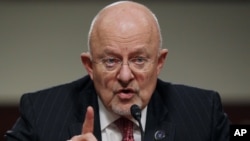The top U.S. intelligence official said Thursday that supplying Ukraine with weapons to fight Moscow-backed separatists would provoke a "negative reaction" from Russia's president, but that he personally backed the idea of providing "lethal assistance" to Kyiv.
Appearing before the Senate Armed Services Committee, James Clapper, director of national intelligence, said that while Russian President Vladimir Putin's actions were difficult to predict, a U.S. decision to arm Ukraine could lead to Russia delivering more advanced weaponry to the separatists.
"I think the intelligence community view is that if we were to provide lethal assistance to Ukraine, that this would evoke a negative reaction from Putin and the Russians," he said. "It could potentially further remove the very thin fig leaf of their position that they have not been involved in Ukraine and could lead to accelerating or promoting more weaponry of higher sophistication to the separatist areas to support the separatists."
Clapper said he personally "would favor" providing Ukraine with defensive weapons, but added that this was his "personal perspective" and "does not represent an official company policy of the intelligence community."
White House officials say they are still considering arming Ukraine, whose forces have at times been outgunned by the separatists.
Clapper said finding a lasting solution to the Ukraine crisis that allows Kyiv to pursue Western integration "will be difficult, to say the least."
"Moscow sees itself in direct confrontation with the West over Ukraine and will be very prone to overreact to U.S. actions," he said. "Putin's goals are to keep Ukraine out of NATO and ensure separatists control an autonomous entity within Ukraine. He wants Moscow to retain leverage over Kyiv, and Crimea in his view is simply not negotiable. Russia's dominance over the former Soviet space is Russia's highest foreign policy goal."
Clapper said he thought Putin was not bent on capturing all of Ukraine, but wanted a separatist "entity" in eastern Ukraine that would include the Donetsk and Luhansk regions. He said Russia was also seeking a "land bridge to Crimea," the peninsula Russia annexed from Ukraine last year, and the port of Mariupol, which separatist forces rocketed in late January.
He said he did not think the rebels were planning an "imminent" attack on Mariupol but wanted to "regroup" and "wait until spring" to start an offensive targeting the port.
At the same Senate hearing, the director of the Defense Intelligence Agency, Lieutenant General Vincent Stewart, said U.S. lethal aid to Ukraine "couldn't be delivered quickly enough or change the balance of power on the ground."
When Republican Senator John McCain of Arizona challenged him, saying that assertion "defies logic," Stewart responded that the separatists and their Russian backers "could resupply a lot faster with a lot heavier weaponry than we could deliver."
The Obama administration is under pressure from McCain and other lawmakers to provide arms to Ukraine. The United States has already provided nonlethal equipment to the Ukraine government.





